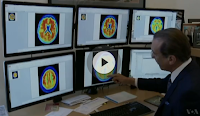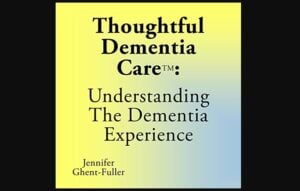MEDICATION & MOOD:
Aggression and agitation are hard challenges in dementia. An important study may offer some simple answers.
In a preliminary 10-week randomized trial, patients with probable Alzheimer disease who received the combination medication dextromethorphan-quinidine demonstrated less occurrences and severity of agitation, compared to patients who received placebo, according to a study in JAMA (The Journal of the American Medical Association)1.
Dr. Jeffrey Cummings, director of the Cleveland Clinic Lou Ruvo Center for Brain Health, said, “Agitation in Alzheimer’s disease is one of the most disabling aspects of the disease. It interferes with the patient’s life. It interferes with the ability of the caregiver to take care of the patient. It degrades the quality of life of both the patient and the caregiver.”
Agitation & Aggression
Agitation and aggression are highly prevalent in patients with dementia and are associated with distress for patients and caregivers, greater risk of institutionalization, and accelerated progression to severe dementia and death. Nonpharmacological interventions are recommended as first-line therapy, but many patients fail to respond. Although many classes of psychotropic drugs are prescribed for agitation, safety concerns and modest or unproven efficacy limit their use, according to background information in the article.
Drug Combo
Dextromethorphan is commonly used in cough medicine. Quinidine is normally used to regulate an abnormal heart beat. Cummings said the combination pill had a substantial effect, greatly reducing agitation compared to the patients who got the placebo. Furthermore, he said, the caregivers also benefited. “There was a reduction in the stress experienced for caregivers of the patients who were treated with the dextromethorphan-quinidine combination.
The combination of the drugs is also approved for the treatment of pseudobulbar affect (a neurologic disorder characterized by episodes of emotional displays such as crying), and there is evidence suggesting the potential benefit of these drugs for agitation. The researchers randomly assigned 220 patients to receive dextromethorphan-quinidine or placebo in stage 1. In stage 2, patients receiving dextromethorphan-quinidine continued; those receiving placebo were stratified by response and re-randomized to dextromethorphan-quinidine or placebo. The 10 week trial was conducted at 42 study sites.
Trial Results
A total of 194 patients (88 percent) completed the study. Analysis combining stages 1 (all patients) and 2 (re-randomized placebo nonresponders) showed significantly reduced measures of agitation (occurrence and severity of symptoms). Patients treated with only dextromethorphan-quinidine had an average 51 percent reduction in the measure of agitation from baseline to week 10, compared with 26 percent for those treated with only placebo.
Adverse events included falls (8.6 percent for dextromethorphan-quinidine vs 3.9 percent for placebo), diarrhea (5.9 percent vs 3.1 percent, respectively), and urinary tract infection (5.3 percent vs 3.9 percent, respectively). Serious adverse events occurred in 7.9 percent with dextromethorphan-quinidine vs 4.7 percent with placebo. Dextromethorphan-quinidine was not associated with cognitive impairment or sedation.
Conclusions
“These preliminary findings require confirmation in additional clinical trials with longer treatment duration,” the authors write.
Pending further evidence, there is a reasonably strong case to prioritize dextromethorphan-quinidine as an off-label treatment for agitation, possibly as a safer alternative to atypical antipsychotics, writes Anne Corbett, Ph.D., of King’s College London, and colleagues in an accompanying editorial.
“However, while further studies are conducted to verify the efficacy and safety of this approach, it will be important to achieve a robust international expert consensus regarding the prioritization of potential treatments for agitation in patients with dementia to improve the consistency of clinical practice. This approach also must understand and incorporate patient and caregiver views regarding the evaluation of risk and benefits in relation to these treatments.”
Source:
- 1The JAMA Network Journals, Sep 22/29,2015
References:
- Clive Ballard, Samantha Sharp, Anne Corbett. Dextromethorphan and Quinidine for Treating Agitation in Patients With Alzheimer Disease Dementia. JAMA, 2015; 314 (12): 1233 DOI: 10.1001/jama.2015.10215
- Jeffrey L. Cummings, Constantine G. Lyketsos, Elaine R. Peskind, Anton P. Porsteinsson, Jacobo E. Mintzer, Douglas W. Scharre, Jose E. De La Gandara, Marc Agronin, Charles S. Davis, Uyen Nguyen, Paul Shin, Pierre N. Tariot, João Siffert. Effect of Dextromethorphan-Quinidine on Agitation in Patients With Alzheimer Disease Dementia. JAMA, 2015; 314 (12): 1242 DOI: 10.1001/jama.2015.10214












Why do they charge so much for the drug combo? Both are old drugs and the copay for 90 days is right at $900.
Nice blog!
I need to find out what type of Alzheimer/Dementia.can you help me.
Marvin
Check out our Diagnosis Section, or the article:
10 Types of Dementia